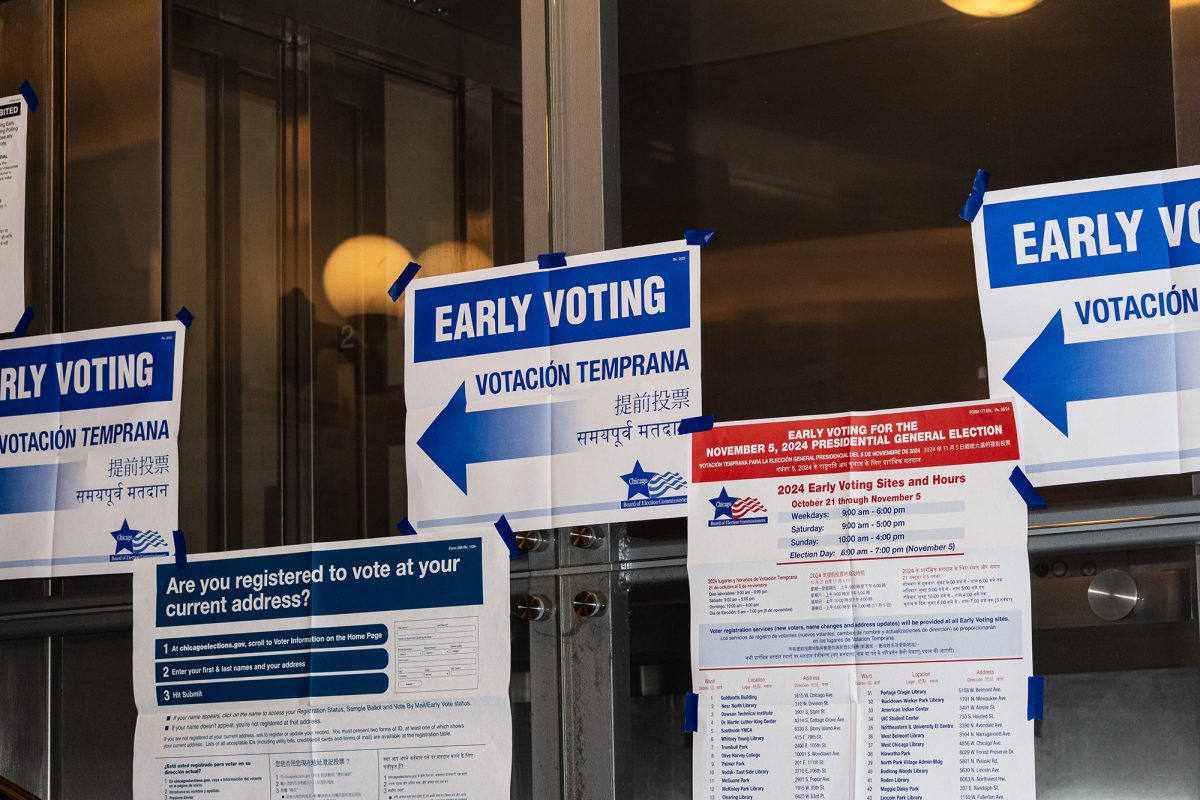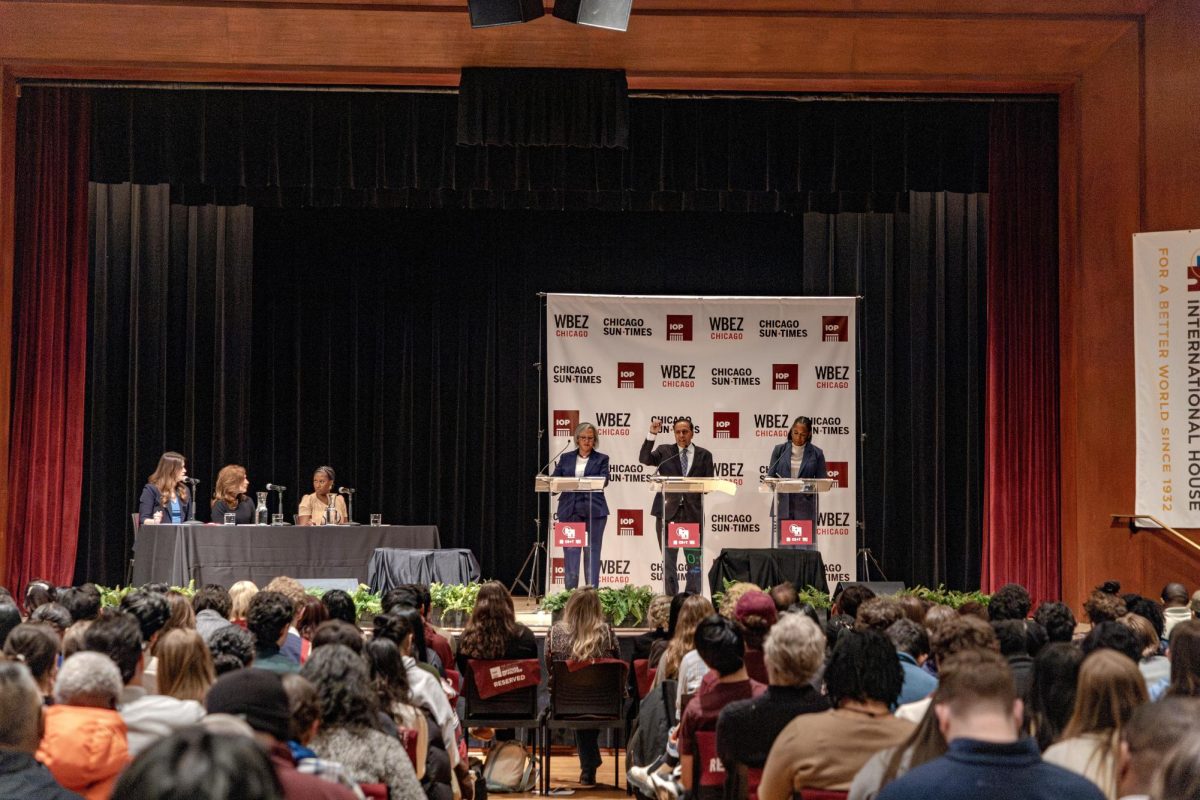Following last week’s debate, “Which Presidential Candidate is Best for Gen Z? A Chuck Todd Moderated Student Debate,” the Maroon has fact-checked some of the most prominent claims from each side of the debate. UChicago Democrats President Kate Davis argued for Kamala Harris, and College Republicans President Chris Phillips argued for Donald Trump. The full debate can be found here.
Economy
Phillips claimed that Trump will “reduce inflation through curtailing government spending through increasing and encouraging energy production and through various other tax incentives, particularly with regard to housing, especially incentivizing potential builders to build new housing through tax breaks.” Trump has proposed increasing energy production through speeding up the approval of drilling permits and leases, stopping environmental litigation, providing tax relief to oil, gas, and coal companies, and rolling back emissions regulations. As for housing policy, Trump says he will create tax incentives for homebuyers and cut “unnecessary” regulations on home construction.
Phillips also cited “rampant government spending” as the “single biggest factor aside from inevitable COVID effects” as the source of inflation. He picked out the American Rescue Plan Act of 2021, popularly known as the COVID-19 Stimulus Package, and the Inflation Reduction Act of 2022 as the sources of “about half of our inflation in the last four years.” The Maroon was unable to find evidence to support this claim.
Davis opened her discussion of Harris’s inflation plans by stating that 23 Nobel laureates recently signed a letter praising Harris’s economic plan as more beneficial for the country. This is accurate—the economists released a letter that calls Harris’s plan “vastly better for [the] U.S. economy” on October 24.
Davis claimed that Harris promises to implement a tax decrease of 2.6–7 percent for those making under $400,000 a year. The Maroon found that Harris has promised not to increase taxes for those in that income bracket, an extension of the same promise made by President Joe Biden, but no mention of the purported tax cuts for that income bracket specifically. She has proposed a $6,000 tax cut for middle and low-income families with children during the first year of their child’s life.
Regarding corporate tax rates, Davis stated that Trump “lowered the corporate tax rate from 35 percent to 21 percent,” referring to the 2017 Tax Cuts and Jobs Act (TCJA). Davis claimed that this decision added “$1.8 trillion to our national deficit.” Many sources calculate the resulting deficit from the TCJA at between $1 and 2 trillion, but the $1.8 trillion deficit figure likely comes from the reported deficit for the 2024 fiscal year.
Davis claimed later in the debate that Trump “added more to our deficit than any other president in history besides George W. Bush and Lincoln.” Although findings differ across sources depending on adjustments made for inflation and other metrics, many sources put Ronald Reagan, both George W. and George H.W. Bush, Barack Obama, and Donald Trump as the top presidents under whom the national deficit increased the most by percentage.
Tariffs
The question of tariffs has been central to both candidate’s political strategies, with Trump and Harris taking opposing stances on their implementation. Tariffs are functionally a tax on imports—domestic buyers pay extra money to the U.S. Treasury when purchasing imported goods, a charge which is usually then applied to the cost of the good for American consumers.
In the debate, Phillips claimed that research has shown that “when we implement tariffs, empirically we found that those costs go down over as little as a year.” Most economists agree that tariffs increase prices and are overall bad for the economy, according to NBC.
As Davis said in the debate, Trump has proposed to implement a tariff of up to 20 percent on all imported goods. Davis also said that “studies show that that’s projected to cost the average American family $4,000 a year.” This echoes a statement by Harris during the September 10 presidential debate but is unsubstantiated. The number likely comes from the left-leaning Center for American Progress’s August calculation of the effects of Trump’s suggested tariffs.
Student Debt
Davis said that Harris will continue the Biden-Harris agenda of “lowering or forgiving debt for 5 million Americans.” The Biden administration approved total loan forgiveness for more than 4.8 million Americans according to an October 17 press release from the Department of Education, but whether Harris will continue this work is unclear.
Davis also claimed that Harris will “be investing in vocational training programs and putting historic amounts into historically Black colleges and universities.” Harris did propose a $60 billion investment in HBCUs during her short-lived 2020 presidential campaign, and the Biden-Harris administration announced additional federal investments in HBCUs totaling $1.3 billion this September.
Phillips claimed that student loan forgiveness would have to be paid for by “poor Americans who happen to pay their taxes and contribute to the system who didn’t get the opportunity to go to college then have to pay into the forgiveness of the student loans of those Americans who did go to college and can’t cut it.” Whether or not student loan forgiveness is paid for with tax increases is a policy issue—in the past, the Biden administration has looked to source this money from reducing spending in other areas, but if this failed, the loan forgiveness would be added to the national deficit, which is largely alleviated either by reduced spending or increased taxation.
Reproductive Rights
Davis claimed that recent restriction on abortion have caused “64,000 women in the 14 states that have total bans to experience rape-induced pregnancies.” This refers to a study published this year in JAMA Internal Medicine estimating these numbers based on many factors such as rates of assault and assault-related pregnancy. NPR, PBS, and Scientific American have all reported on this study as reliable.
Davis also claimed that maternal mortality is “skyrocketing” due to abortion restrictions and that “1.1 million people have died because of this over two years.” In 2022, the United States averaged 22 maternal deaths for every 100,000 live births; global maternal deaths per 100,000 lives births averaged 158.7 in 2021. The Maroon was only able to source the 1.1 million metric as the number of abortions estimated to have been performed in the United States in 2011.
After Phillips correctly claimed that Trump has not committed to implementing federal abortion policies, Davis claimed that Trump has waffled on his abortion stance in accordance with election strategy alone, saying at a rally, “You gotta do what you gotta do to win elections.” The Maroon was unable to find this statement expressed in the context Davis alleged.
The debaters disagreed on whether abortion restriction increases or decreases abortion rates. Neither stance is correct, with historical data from around the world showing that rates of abortion do not significantly increase or decrease with restrictions. Davis’s claim that maternal mortality rises with abortion bans, however, is substantiated.
Security and Immigration
Davis’s argument centered around Harris’s past accomplishments in diplomacy: “When [Harris] was in charge of diplomacy between the northern triangle and Mexico, she came up with creative solutions like getting $5.1 billion in private investment to spur job growth and economic stability in those regions. What we’re seeing now is migrants from Mexico and the Northern Triangle dropping in their crossing patterns of up to 81 percent.”
In 2021, Harris was indeed appointed to “lead our efforts with Mexico and the Northern Triangle and the countries that are going to need help in… stemming the migration to our southern border,” according to remarks from President Biden. The project generated more than $5.2 billion in investments over three years. The Pew Research Center reports a decrease in crossings at the U.S.-Mexico border of 77 percent from December 2023 to August of 2024; the 81 percent figure likely came from the center’s breakdown of encounter rates by nationality, which showed an 81 percent decrease in encounters with Guatemalans in particular.
Phillips and Davis discussed a bipartisan border and national security bill which received low levels of Republican support earlier this year. Davis claimed that “Donald Trump knew that if that bill was passed, it would block his path to victory, so he killed it.” While Trump’s direct involvement with the bill’s failure is not confirmed, he did disparage the bill, calling it “a terrible bill” shortly before it failed to pass.
Phillips claimed that the bill had “baked into it a 10,000 illegal migrant per day cap.” This likely comes from House Speaker Mike Johnson’s false claim that the bill would allow “5,000 illegal crossings a day,” when in fact the bill would give the Department of Homeland Security the authority to close the border if they reached a seven-day average of 4,000 or more border encounters, or if the number exceeded 8,500 in a single day. Encounters are not the same as crossings, and crossings would not be allowed before asylum claims were approved.
The War in Ukraine
Davis began her discussion in this section with a criticism of Trump’s attitudes towards Russia: “Savvy, a potential best friend, someone doing a good job: these are all words and phrases that Donald Trump has used to refer to Vladimir Putin.” In 2007, Trump said that Putin was “doing a great job in rebuilding the image of Russia” to Larry King on CNN; Trump tweeted the “new best friend” quote in 2013 regarding his involvement in the Miss Universe pageant hosted in Moscow; he called Putin “savvy” in reference to the invasion of Ukraine.
The Middle East
Davis claimed that Harris is the “one candidate in this race” who has called for a ceasefire in Gaza, and that Trump called Netanyahu, “trying to govern over a country he’s not in charge of, which is illegal by the way, and he told Netanyahu to do whatever he needed to do.”
Harris has called for a ceasefire since March of this year. In an interview, Trump said of the October 20 phone call with Netanyahu, “He was asking what I thought. And I just said, you do what you have to do.”
Crossing the Aisle
Towards the end of the debate, Davis invited listeners to look into Trump’s past statements: “If you go on Truth Social tonight, you’re going to see that, consistently, over and over again, [Trump has] called the U.S. people the enemy from within. He’s called us, young students who disagree with him, the enemy, and he’s threatened again and again to use the power of the U.S. Military and the Department of Justice to go after those that he doesn’t agree with.”
Trump has made statements identifying a vague “enemy from within” and “radical-left lunatics” at rallies and in interviews. On Fox News this October, he said that this enemy “should be very easily handled by, if necessary, by National Guard or if really necessary by the military, because they can’t let that happen.”
Davis also cited that former Chief of Staff John Kelly “came forward because he couldn’t have it on his conscience that Donald Trump told him that he wanted generals more like Hitler’s.” An Atlantic article this month by Jeffrey Goldberg claimed that Trump said that he needed “the kind of generals that Hitler had.” Kelly has claimed that Trump once asked him, “Why can’t you be like the German generals,” clarifying later in the conversation that he meant “Hitler’s generals.”















